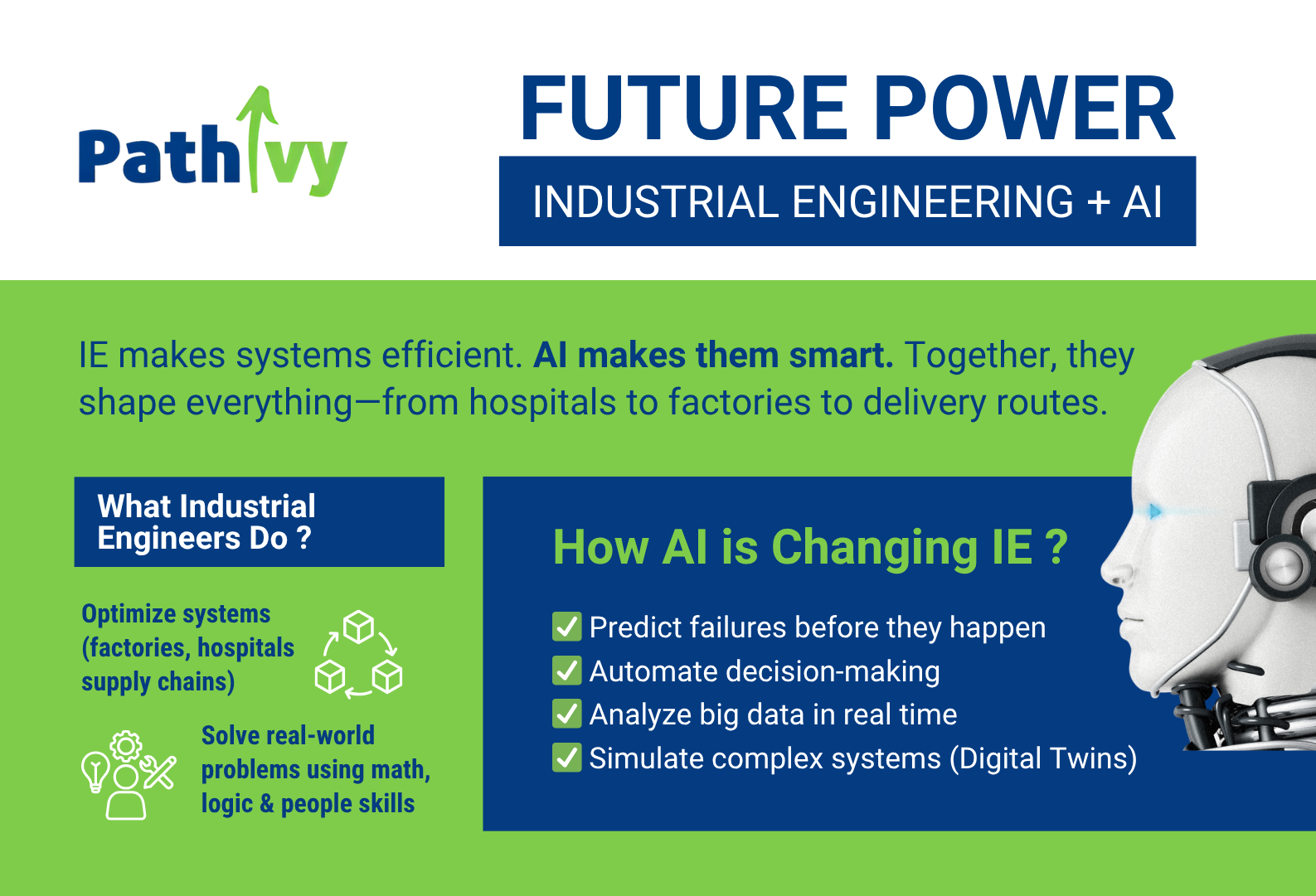Introduction
In a world powered by automation, robotics, and data, two powerful fields are merging to shape the future: Industrial Engineering (IE) and Artificial Intelligence (AI).
Industrial Engineers design the systems behind logistics, manufacturing, healthcare, and even space exploration. AI makes those systems faster, smarter, and more adaptive.
If you’re a student who loves solving puzzles, thinking in systems, or applying math to real-world problems, this future might be for you.
What Do Industrial Engineers Do?
Industrial engineers focus on making systems more efficient, whether in factories, airports, hospitals, or supply chains. They study how things work, then improve them.
Industrial Engineering = Efficiency + Systems + Problem Solving + People
How AI Is Changing the Game
AI adds the ability to:
- Predict problems before they happen
- Learn from data patterns
- Automate decision-making
- Simulate real-world systems with stunning accuracy
Combined with IE, it creates smart systems that power the world.

Career Paths: Profiles of Real Professionals
1. Rachel Kim – Smart Factory Systems Engineer at Tesla
Education: B.S. Industrial Engineering, Georgia Tech
Now: Designs and deploys AI-driven workflows for battery assembly.
Q: What does your day look like?
I use simulation software to test production changes, then work with our AI team to train models that help machines detect defects in real-time. Every day involves Python, data dashboards, and solving unexpected bottlenecks.
Advice for Students:
Start learning Python, and don’t be afraid of math. Also, get good at communicating ideas clearly—engineers work in teams.
2. Jalen Patel – AI Optimization Specialist at Amazon
Education: B.S. Industrial Engineering, M.S. Machine Learning, UIUC
Now: Uses AI to optimize last-mile delivery across North America.
Q: What role does AI play in your job?
We use AI to predict the best delivery routes every day—taking into account weather, traffic, package type, and more. The models constantly update based on real-world data.
Advice for Students:
Take a data science course early. Try Kaggle competitions—they’re great for applying theory to real-world problems.
3. Fatima El-Tayeb – Healthcare Systems Engineer at Mayo Clinic
Education: B.S. in IE, minor in Public Health, Northeastern University
Now: Builds hospital staffing and equipment allocation systems using AI forecasts.
Q: How do you use AI in healthcare?
We use machine learning to predict ER traffic based on flu trends and past data. That helps us schedule nurses, clean rooms, and assign equipment more efficiently.
Advice for Students:
Healthcare is a human system. Learn how to balance tech with empathy. Take bio or psych alongside your math and CS classes.
4. Miguel Santos – Supply Chain Innovation Manager at Nike
Education: Dual B.S. in IE and Business Analytics, Oregon State
Now: Designs AI-powered forecasting tools for inventory planning.
Q: What excites you most about your work?
We use AI to figure out how many shoes to ship to which city, in which size, before anyone even orders them. Getting it right reduces waste and speeds delivery.
Advice for Students:
Learn systems thinking—how everything connects. Read “The Goal” by Eliyahu Goldratt and learn Excel really well before moving on to Python.
Skills You’ll Need in This Field
|
Core IE Skills |
AI-Enriched Tools to Learn |
|
Systems Design |
Python, SQL |
|
Operations Research |
Machine Learning (Scikit-learn, etc) |
|
Simulation Modeling |
Digital Twins, AnyLogic, FlexSim |
|
Human Factors & Ergonomics |
AI Ethics, Human-in-the-loop systems |
|
Supply Chain Optimization |
Data Visualization (Tableau, PowerBI) |
What Can You Do Now in High School?
Take These Courses:
- AP Calculus, AP Stats
- AP Computer Science A or Intro to Python
- Engineering Design, Robotics, or CAD
- Economics or Business
Do These Projects:
- Simulate a school’s bus schedule to optimize routes
- Use Python to analyze cafeteria waste patterns
- Build a Raspberry Pi sensor system to track temperature or speed
- Design an efficient "factory floor" using Lego Mindstorms
Join Clubs and Competitions:
- FIRST Robotics or VEX – systems thinking & engineering
- Science Olympiad – events like “Lean Production” or coding
- TSA or SkillsUSA – real-world tech competitions
- FBLA/DECA – business strategy with operations insight
Try These Summer Programs:
- MIT Beaver Works: AI + Systems
- Columbia Pre-College: Data Science or IE
- AI4ALL or Inspirit AI
- University of Michigan IOE Summer Program
Final Thought: Why This Field Matters
In the AI age, we don’t just need more software engineers; we need system thinkers who can design smarter workflows, human-centered AI tools, and real-world solutions.
That’s what Industrial Engineers do.
With AI, their impact multiplies, touching everything from how fast you get a package to how quickly someone gets treated in an ER.
If you're curious, analytical, and love finding better ways to do things, start your journey now. The world needs future builders like you.
.png?width=175&height=73&name=ORIGINAL%20LOGO%20Blue%20and%20Green%20(1).png)
.png?width=50&name=author-image%20(2).png)

